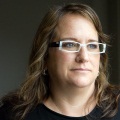AUCD - Training Symposium: Going To Scale Using Implementation Research: Closing the Gap Between Science and Service
<< Back to ProgramMonday, November 1, 2010 1:15 pm - 4:30 pm
Location: Washington Room
Session Description
Presenter Bios:

Amy Hewitt, Ph.D.: Ms. Hewitt has an extensive background and work history in the field of intellectual and developmental disabilities and has worked in various positions over the past 28 years to improve community inclusion and quality of for children and adults with disabilities and their families. She is currently a Senior Research Associate and Director of Interdisciplinary Training at the University of Minnesota, Institute on Community Integration and the MN LEND where she directs several federal and state research, evaluation and demonstration projects in the area of community services for children and adults with intellectual and developmental disabilities. Ms. Hewitt is a national leader in the area of workforce development and community supports to individuals with intellectual and developmental disabilities. She was a founder of the National Alliance for Direct Support Professionals and has been instrumental in the development of the NADSP national credentialing and accreditation program.

Tawara Goode: Ms. Goode is an assistant professor in the Department of Pediatrics, Georgetown University Medical Center in Washington, D.C. She has been on the faculty of the Georgetown University Center for Child and Human Development (GUCCHD), for the past 30 years and has served in many capacities. She has degrees in early childhood education, and education and human development, and over 32 years of experience in the field. She is currently the Director of the National Center for Cultural Competence (NCCC) at GUCCHD and has served in this capacity for the past 12 years. Ms. Goode is nationally recognized as a thought leader in the area of cultural and linguistic competency and had a primary role in developing curricula, assessment instruments, professional development series, and other resources that support cultural and linguistic competence. Ms. Goode has been actively involved in the development and implementation of programs and initiatives in the area of cultural and linguistic competency at local, national and international levels. These efforts address the needs of diverse audiences including health care, mental health, social services, early childhood/special education, developmental disabilities and special health care needs, community/advocacy organizations, professional societies/organizations, and institution of higher education. Ms. Goode has conducted research on cultural and linguistic competence and its role in addressing health care disparities and is currently involved in a collaborative effort to create validated instruments to measure cultural and linguistic competence in health care settings. Ms. Goode has published articles, monographs and policy papers that support cultural and linguistic competence in a variety of settings. Ms. Goode continues to serve on numerous boards, commissions and advisory groups at the local and national levels that are concerned with addressing racial and ethnic disparities and promoting equity for culturally and linguistically diverse groups and the communities in which they live.

Karen Blase: Karen Blase has been a service provider, educator, researcher, program evaluator and published author in the human service field for over 35 years. She received her doctorate in Developmental and Child Psychology from the University of Kansas with a focus on school-based interventions, teacher training, and community-based services for high needs youth. She is a Senior Scientist at the Frank Porter Graham Child Development Institute at the University of North Carolina at Chapel Hill and a Co-Director, along with Dr. Dean Fixsen, of the National Implementation Research Network. She and Dr. Fixsen also are Co-Directors of a federally funded OSEP TA Center for State Implementation and Scaling of Evidence-Based Practices (SISEP). Karen has a wealth of practical experience in human services having worked in juvenile justice, in child welfare services, education settings, and in developing community-wide and agency domestic abuse intervention and prevention services. As part of a research team, Dr. Blase was involved in completing a major review and synthesis of the implementation literature. This extensive review of implementation strategies and proposed frameworks is providing guidance for the adoption and use of evidence-based programs and practices in education and child welfare
Dr. Blase will provide an overview of the science and practice of implementation, organizational change, and scale-up. By attending to implementation factors, evidence-based services and innovations can be implemented with fidelity, scaled-up for access, and maintained over time. The frameworks Dr. Blase will present emphasize best practices for promoting competent and confident staff, improving the alignment of organizational policies and practices, and strategies for scaling up.
Implementation Research is:
- research focused on closing the gap between science and service by improving the science and practice of implementation in relation to evidence-based programs and practices,
- while using implementation methods that assure the use of evidence-based programs and other innovations with fidelity and benefit to consumers.
Following Dr. Blase's keynote presentation, network members will present on replication of evidence-based models in areas such as including autism, disparity, victimization, early intervention, and others. Panelists will have an opportunity to receive feedback about their projects from Dr. Blase. Speakers will be chosen from those who submit proposals on this topic to the AUCD 2010 Conference Call for Proposals. Presentations will likely address research, evaluation, and case studies focused on but not limited to one or more of the following areas:
- Challenges and strategies related to adopting and implementing evidence-based programs and practices
- At the practice level
- At the organization level
- At the service system level
- Challenges and strategies related to scaling-up an effective intervention or practice
- Effectiveness of professional development strategies to improve staff competence
- Strategies for changing the behavior of practitioners, supervisors, agency administrators, and funders
- Data-based decision-making systems and strategies for program and practice improvement
- Strategies related to monitoring and improving fidelity
- Impact of coaching on staff competence and fidelity
- Creating readiness for service and system change and developing "buy-in"
- Strategies for analyzing and changing policies, procedures, and/or funding to facilitate the adoption and sustainability of programs and practices
- The role and function of collaboration in service and system change
Additional time will be provided for attendees to ask questions and dialogue with Dr. Blase and the network presenters.
Symposium Goals
Training Symposium attendees will obtain an overview of:
- best practices for promoting competent and confident staff,
- improving the alignment of organizational policies and practices,
- strategies for scaling up, and
- real projects from project investigators.
Featured Presenter(s)
 |
- Karen Blase, PhD; Senior Scientist, Frank Porter Graham Child Development Institute; Co-Director, National Implementation Research Network
- Tawara Goode; Director, National Center for Cultural Competence & Associate Director, University Center for Excellence in Developmental Disabilities, Center for Child & Human Development; Assistant Professor, Department of Pediatrics, Georgetown University Medical Center
- Amy Hewitt, Phd, MSW; UCEDD/LEND Training Director, Institute on Community Integration, University of Minnesota
